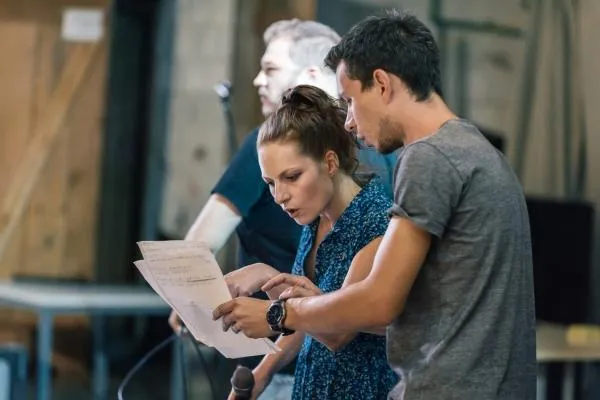See Our Latest Blogs
Insights on innovations and best practices for hybrid events and content management.

Event Pre-Production: The Importance of Rehearsals and Redundancies
by Kevin Cato, Coordinator and Technician at OneBXL
As a technician I have worked on countless hybrid events over the past few years. From small webinars to major conferences at the EU Parliament, I've seen it all when it comes to event production. And in my experience, nothing is more important than thorough preparation and planning. With hybrid events relying so heavily on technology, having rock-solid pre-production processes in place is absolutely critical for success.
Just last month, I was the lead technician for a major client's hybrid end-of-project meeting. It was a high-stakes event with hundreds of virtual attendees and over 70 in-person guests. The stakes were incredibly high, as any tech issues could damage their brand. Needless to say, our team took preparation very seriously. We scheduled multiple intensive rehearsals over the weeks leading up to the event, identifying any potential points of failure and developing contingency plans.
During one of the preparation process we uncovered that the venue wasn’t wired for sound, it didn’t have a projector screen, and the ethernet was at the complete opposite of the room of our streaming computer. We troubleshooted for hours trying to resolve it, we broke the problem down into smaller parts, and we found workable solutions. Because we did robust testing, we prevented what could have been a catastrophic tech failure.
On the final dress rehearsal, our projector screen rental arrived. It was huge! It was roughly two meters tall and four meters wide. At first, I worried that it would be far too big. But there was no time for worry, so we set up the system, tested it, and went home for the night. The next morning at the event, the projector screen was a hit! At this meeting, many of the slides presentations had a lot of small font – not ideal, but a common reality at events – and the huge screen showed everything in vivid detail! I even saw people taking photos of the big screen with their phones so that they could capture the slide! The lesson here is to practice, be well prepared, and if a new variable presents itself during the final dress rehearsal, don’t panic! Control what variables you can, trust your training, and things might just turn out well in the end – or, in this case, better than you would have planned!
In this article, I want to provide an insider's perspective on just how vital comprehensive pre-production processes are for hybrid events. I'll share tips and best practices I've learned from my decade of experience, so you can confidently prepare for your own hybrid events.
Schedule Multiple Rehearsals
When planning the pre-production schedule, you should budget ample time for rehearsals - I'm talking weeks or even months of preparation for large-scale events. Trying to cram testing into a few days simply isn't sufficient for hybrid. You need to identify issues early so there's time to resolve them.
Especially for larger-scale events, I recommend scheduling full rehearsals for each major session, presentation, and stage change. Treat them like real run-throughs, with speakers doing their actual presentations and technicians testing all transitions. The more you can simulate event conditions, the better. I've seen far too many organizers try to cut corners and just do a brief tech check, only to end up scrambling to fix problems last minute.
If you're on a tight timeline or budget, prioritize testing the riskiest and most mission-critical parts of the event. For example, rehearse the main keynote presentation five times if you need to. It's better than testing every small session once. Focus your efforts where it matters most.
In reality, most of our small-scale events are on a tight budget and schedule. Speakers only fly in the night before, the same limited window that we have to set up our technical equipment, and some of them even arrive the morning of the event – and if they’re stuck in traffic, they’re late for their keynote. While this is hardly ideal, it is the reality of events in the capital city.
If you’re an event planner, just try and do your best to clearly communicate to your speakers when you would like for them to arrive – both for rehearsals and for the event. For example, consider letting them know in advance whether or not they’ll have a wireless lavalier microphone attached to them, or if microphones will be sitting in front of them on the table. If the speakers are online, be sure to schedule a quick check during the technical setup. Remember: there is no time for checking your Zoom connection and asking “can you hear me?” the morning before the event! Even the busiest of speakers can make a little time the evening before.
Provide Speakers Rehearsal Opportunities
One common mistake I see is not giving speakers enough chance to practice their delivery in the hybrid environment beforehand. Especially if they aren't experienced public speakers, they'll need multiple opportunities to get comfortable with the technology and flow.
During rehearsals, speakers should practice their presentations as if it's the real deal - standing at the podium, on stage, wearing a mic, etc. For virtual presenters, connect them to the platform and streaming software you'll use on event day. This allows them to get familiar with video lighting, optimal camera angles, screen sharing, and managing chat questions.
The rehearsals also offer the production crew valuable practice troubleshooting any speaker issues. You want the first time dealing with problems to be in the low-stakes rehearsal setting, not when it really counts during the live event.
I always reassure nervous speakers that flubs are expected at this stage. Rehearsals are about identifying what can go wrong so it can go right when it matters.
In reality, most of our small and mid-size events in Brussels skip this step – and sadly, it’s noticeable. It’s such a shame to work so hard on preparing a big final event and to have these distractions due to a lack of preparation. At OneBXL, we love spending an extra moment with speakers who lack prior media training, giving them a little crash course on public speaking and microphone usage. Most speakers have a bit of extra time before the big event, it just takes some planning in advance to get them to come to rehearsal.
Build in Redundancy Everywhere Possible
In addition to thorough testing, a best practice I swear by is building redundancy into your technical setup wherever feasible. Have backup equipment, spare computers, extra cameras - anything that could fail and bring things grinding to a halt if it did. The costs of redundancy pay for themselves tenfold if it prevents a problem during a live event.
Some key areas I recommend having redundancies:
Internet lines - Have multiple hardwired connections from different providers. Bonus points for 4G/5G hotspot backups.
Power sources - Plug equipment into battery backups or separate building circuits.
Streaming encoders - Have a second encoder ready to switch to if the main feed fails.
Presentation computers - Provide speakers with identical primary and backup laptops.
Cameras - Have extras of common failure points like PTZ motors or HDMI ports.
Mics - Keep spare transmitters, receivers, and batteries on hand for talent.
Staff - Train understudies for key production roles.
I know it may seem excessive, but trust me - I've used nearly every backup we've ever prepped at some point to save a client event. Just recently, our main video switcher started overheating mid-program at a major conference. We seamlessly hot-swapped over to the redundant switcher without missing a beat in the live stream. Disaster averted thanks to a spare piece of equipment!
We also build in redundancy when it comes to making recordings. It adds up to extra terabytes of raw footage, which takes some managing, but in order to guarantee delivery of raw footage of the event, you need to record backups just in case something goes wrong. And if your goal is to repurpose your live event footage into social media content, then this is especially important.
Have Contingency Plans Ready
Even with abundant redundancies, you still need to prepare contingency plans in case problems do occur. This is especially critical for hybrid since streaming interruptions, video lag, and audio issues can happen due to factors out of your control.
Think through what could reasonably go wrong and have a documented plan ready to swiftly address it. For example, have a dial-in conference line prepared as a backup sound source if your main audio cuts out. If connectivity gets spotty, have remote moderators and producers ready to manage content and chat discussions. Identify potential failure points in the agenda and have alternate content or speakers ready to go.
I once managed a virtual panel discussion where the lead presenter's home internet went down just minutes before going live, leaving us scrambling. In hindsight, we should have had a backup moderator prepared to steer the conversation until the connection was restored. Build in those kinds of contingencies and your team can handle whatever gets thrown your way.
Invest Time Commensurate with Scale
The amount of preparation time and redundancies needed depends heavily on the scale, budget and organizational impact of your hybrid event. A simple internal training webinar may only require an hour of rehearsal and basic redundancies. But a revenue-driving product launch, media event, or large conference deserves days of intense preparations and robust backup plans.
Take a pragmatic approach - don't over-engineer the technical setup and contingency plans for a low-risk event. But for mission-critical programs, go above and beyond. Your organization's brand reputation and business results are on the line, so invest the time and resources needed to protect them.
I always tell my team that our job as technicians is to make the technology invisible. Attendees should be focused on the content and conversations, not on whether the mics are working. That's achieved through exhaustive preparation to mitigate risks.
Conclusion
In my time running A/V and broadcast, I've learned first-hand just how vital comprehensive pre-production is for hybrid events. Simply put, you can never overprepare when technology is integral to success. Schedule abundant rehearsals, build in redundancy everywhere feasible, and have contingency plans ready for problems. It requires more work upfront, but that investment pays off exponentially in flawless program execution.
At the end of the day, attendees expect hybrid events to work seamlessly. Your speakers deserve confidence their presentations will come off without issues. And your organization's brand hangs in the balance. With so much on the line, make rehearsals and redundancies a top priority for your next hybrid event. The more preparation you do, the more smoothly your event will run when it matters most.
Want help ensuring your next hybrid event goes off without a hitch? Learn more about OneBXL's event production capabilities here. We've produced successful hybrid events in Brussels since 2020 and we can bring that expertise to your organization. Let's chat about how we can partner to make your next program shine!
Further reading
Innovative Ways to Blend In-Person and Virtual Experiences in Hybrid Events
The Hybrid Event Technology Stack: Best Practices for Seamless Experiences
OneBXL’s Guide to Using Zoom for Your Next Hybrid Event
The Power of Repurposing: Extending the Lifespan of Hybrid Event Footage
©2023 One Bxl - All Rights Reserved

